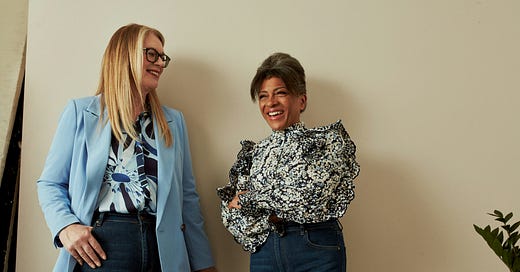No, no, you’re thinking, menopause is for other women. Older women. You have years and years before you have to think about that… and yes, that may be true, but it’s still coming for you.
Menopause is coming for all of us.
Have kids, don’t have kids. Get a hysterectomy, don’t get a hysterectomy. If you’re a female (or assigned female at birth), you’re going to experience menopause.
It’s inevitable.
Wait. It gets better. You also get to experience perimenopause. Because one transitional period isn’t enough, we now have a term describing the time right before menopause — which, let’s be honest, is basically the start of menopause.
This is when women start experiencing symptoms like tiredness, palpitations, sore breasts, thinning hair, and joint pain, among others. And unfortunately, this can happen earlier than you think.
But are you ready for it?
I know I’m not.
It’s not like you suddenly gain energy or strength in menopause… quite the opposite, actually. It sounds quite terrible, honestly, and it should come as no surprise that I think this.
Menopause has always been a taboo and stigmatized topic.
First, it’s associated with the end of fertility and aging, and you know how much our society hates aging women.
Second, we’ve had little and often an inaccurate representation of menopause and menopausal women in entertainment, literature, and media.
Third, it has not been properly addressed in medicine or in our healthcare system, leading to gaslighting and insufficient, inaccurate, or ineffective treatment.
Fourth, nothing good seems to come from menopause, so it’s hard to glamorize it. There’s no beautiful baby bump, no glowing skin, no perky (albeit leaky) breasts. It’s more often associated with sagging skin, dryness, and weight gain, which nobody really wants to talk about it.
But the times they are a-changin'… and it seems menopause is finally getting the attention it deserves (and no, I don’t count the Broadway show that premiered in 2001, shocking audiences nationwide).
Menopause is being talked about on a much larger scale and by very public figures — Naomi Watts, for example, started experiencing symptoms at 36, and Drew Barrymore admitted to having a period every two weeks during perimenopause.
Menopause care is exploding. Dozens of companies are arising in the space (i.e. Evernow, Elektra Health, Midi, Gennev), which is increasing the education around menopause and giving women more affordable, accessible care options.
Employers are starting to include menopausal care benefits in employee packages, partly because there’s a demand for them (64% of women want menopausal benefits) and partly because menopause is so costly to our economy. According to the Mayo Clinic, $26.6 billion is lost every year to employee management of menopause symptoms (which includes lost work time).
The industry is so big (and trendy) that even pregnancy/postpartum-focused companies are trying to carve out a piece of the menopause pie (i.e. Maven Clinic, Carrot Fertility, Progyny, etc).
By 2030, the global menopause market is expected to reach $24.4 billion.
This is good. This is exciting. My hope is that it means future menopausal women like myself will get more support, more answers, and more reliable treatment options in a more efficient, affordable, and accessible manner.
But this is assuming that investors recognize that menopause isn’t just a trend. This is assuming that medical professionals take perimenopause seriously and start to address the underlying health issues (like the decline of testosterone) as opposed to the symptoms (hot flashes). This is assuming that our society continues to talk more openly about menopause, raising awareness and reducing stigma.
This is assuming that we all collectively understand that menopause is a critical women’s health issue that demands more research, more innovation, and more money.
I’m hopeful for the future of menopause care. I’m hopeful, even though I’m still thinking, menopause isn’t coming for me. Not yet. Fingers crossed.
Mind
Physical activity and social support have shown to positively influence the mental health of women experiencing menopause symptoms.
Body
A non-hormonal fertility pill has shown to improve embryo implementation, pregnancy, and live birth rates for IVF patients.
Papcup offers a new at-home cervical cancer screening… and it makes me wonder why more researchers aren’t studying menstrual blood?
Beyond
The FDA has released new guidance around diversifying participants in clinical studies.
Honey & cinnamon lattes
If you haven’t had a “cafe miel,” I highly recommend. I’ve been buying them from my local coffee shop, but also making my own at home with ice and oat milk.
Not Like Us
I’m still not over this diss track, which has reached over 15.4 million views in less than two weeks. The artistry is chef’s kiss.
The Bear
Speaking of chefs… I love the writing of this show. The anxiety? The stress? Not so much. But, having worked ever so briefly in the restaurant industry, I believe this is an accurate representation and one we needed.
Aerie
As a thirty-something mom, I know I’m not the target audience for this brand that I love, but is it possible to age out of a brand? I think I know the answer to that… but if yes, where am I supposed to be shopping for comfy, casual, and affordable work-from-home clothes? Seriously, where? Please comment or reply!
Did you like what you read? If so, please subscribe or forward to a friend!









just dont buy into it